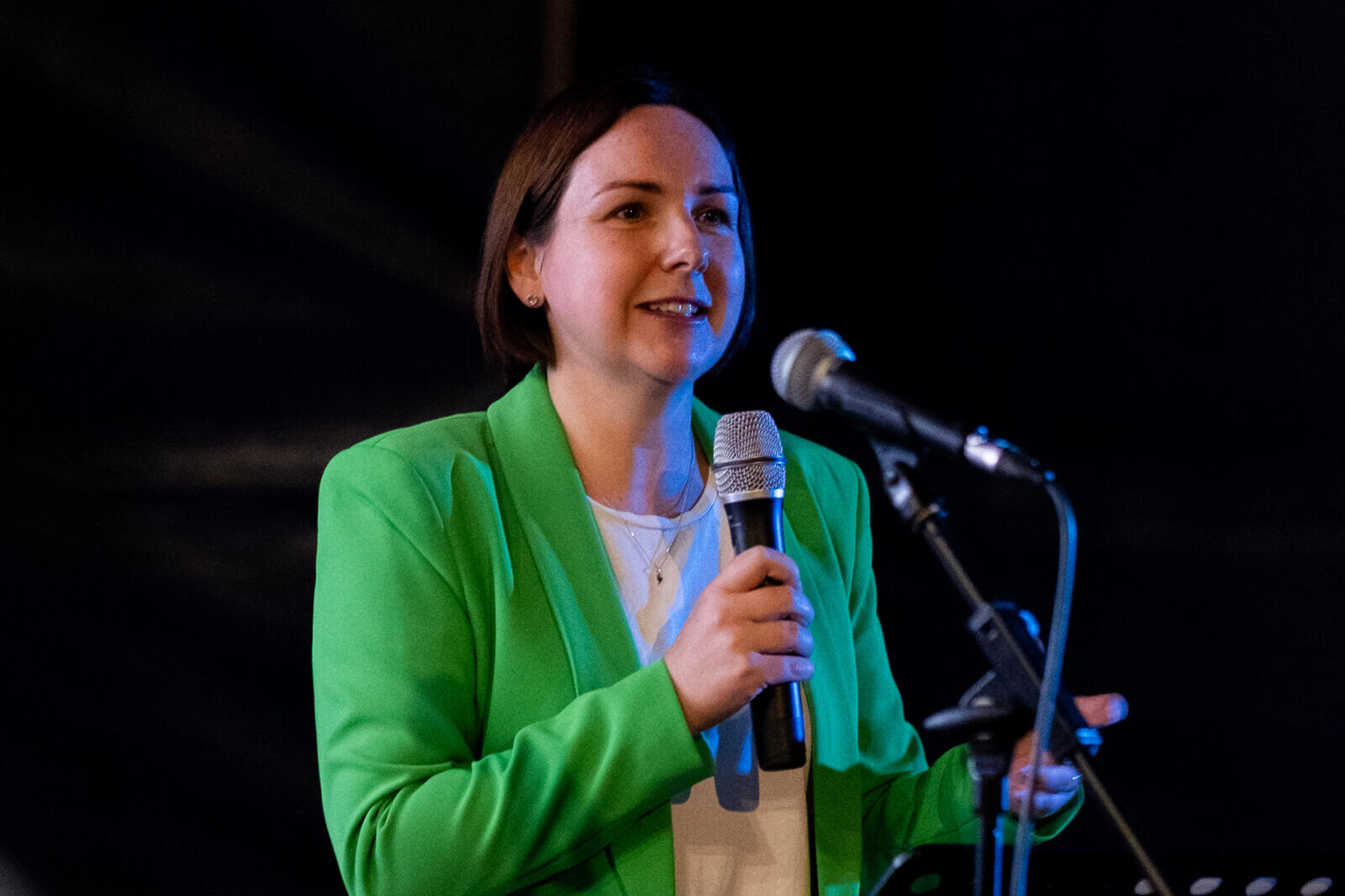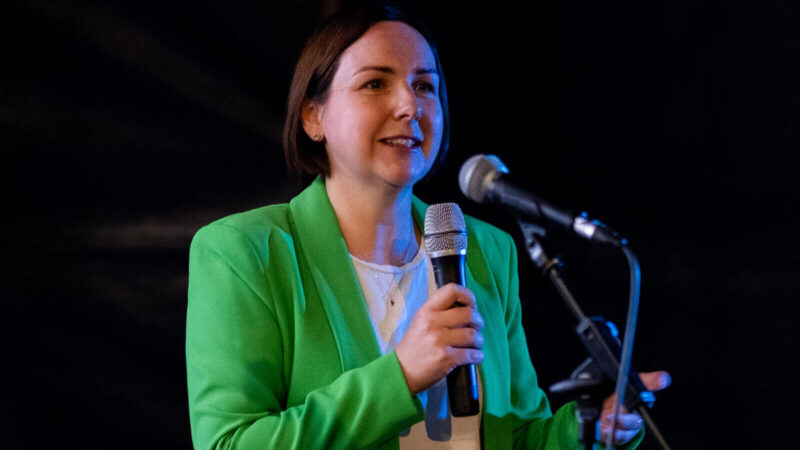By Lucy Begbie, NH Media Team
Any parent looking for a quick fix, looking for a wham bam moment to end all their agonies in doing battle with their teenager in the messy arena of technology, will be dismayed at first, by the advice given by Deborah Webster of Thrive Academy.

I put my hands up. I am that parent she refers to who wants to throw their teen’s phone down the toilet and chuck their device out of the window – and trust me I’ve come pretty close to it. But no, in a lightbulb moment at Deborah’s seminar at New Horizon festival I suddenly realise I have better options. And she should know.
The former teacher who was also responsible for safeguarding at the Presbyterian church for ten years, and has children entering their teens, carried out research for her PhD on ‘How Using Social Media Impacts Children and Young People’. So let’s put it this way – she knows a thing or two.
Those of us listening self-consciously in the packed seminar are from the outset reassuringly told that there is ‘no judgement here’, ‘we all parent and do family differently’, and that ‘using technology, isn’t it the biggest challenge for this generation?’
But, Deborah comments, as Christians, as parents we are given advice to follow:
Train up a child in the way they should go; even when they are old, they will not depart from it.
Proverbs 22:6
She says, “many of us parents can feel overwhelmed… ‘I’m just a technophobe, let them crack on and work it out,’ and yet the bible is telling us to help our children, to train them, to disciple them…we can’t just ignore this whole area of their lives – it’s part of their lives today and certainly part of their lives in the future
“…We need to be talking to our young people, to our children, about the impact that using any kind of digital device can have on them – not just keeping them safe online, which is so important, which we will talk about, but also about how they feel about themselves and how they feel about their lives and the world they live in.”
“… difficulties, challenges come along to a child, what’s the ability they have to bounce back, to get on with the rest of their day, the rest of their life? And digital resilience is very much that in the online space.
“ It’s not about throwing devices out of the window, maybe even not about saying no, but saying not yet. It’s about them enjoying the positives while learning to cope with the things that are not so good.”
Deborah refers to the work of Sonia Livingston, Professor of Social Psychology at London School of Economics, who highlights the four C’s in the young person’s digital world: content, contact, conduct and contract.
‘Content’ is what our children are looking at online, and from talking to primary school children in P6 and P7, children at Girls Brigade, and young people up and down the country the former teachers is highly aware that a big challenge for them is seeing things they don’t want to see, that upset or disturb them such as pornography and self-harm and suicide videos.
Algorithms may be showing them videos deemed of interest to young people of a certain age, or sending them things other people of their age are looking at. Eating disorders rocketed during lockdown and so is it really helpful for a teen struggling with such a disorder to be continually confronted by celebrities on Tik Tok describing ‘ what I eat in a day’ – which usually doesn’t amount to much – or being tempted to look at pro-eating disorder accounts.
‘Contact’ is who our children are talking to, and ‘Conduct’ is how they’re communicating. A lot of the school principals, talk about the nastiness of the communication online, the language used, and the things young people say they would never say to someone’s face. It is therefore important that parents educate their young people about the law and the repercussions of your digital imprint.
Grooming and blackmailing are concerns as well, and in talking to PSNI she’s very aware that there are those with fake profiles contacting young people on social media, befriending them, persuading them to send inappropriate photos and then threatening to show the photos on social media if their demands for money are not met.
And the final of the four C’s is ‘Contract’. Influencers play a big part in young people’s lives but why do they make videos and post them online? To make money of course. But it’s not always obvious and young people can end up buying things that may even be unregulated.
But it’s not all doom and gloom. There is something known as the Goldilocks principle meaning ‘just the right amount’. If you ask teenagers why they like being on social media so much they will say ‘because we like talking to our friends’. No screen time, Deborah says, can be negative as children can feel left out by their peer group if they’re not in contact with them.
At the same time they are also missing out if they are not getting enough time being creative, building Lego, making things with play dough, baking, being outside, doing exercise and sport and not getting enough sleep. It’s all about balance.
Research has also shown that there is a big difference on well-being between positive active time on social media, such as chatting to friends or building something, and negative passive time scrolling You Tube or TikTok videos for instance.
In answer to many a desperate parent’s question, ‘How long should they be on their screen?’ The answer is more complex then – it depends on what they’re doing on there we’re told. The advice given was we need to keep talking to our children, to our young people, about what they’re doing online, avoiding interrogation, watching our tone, being positive but being intentional about conversations.
I think I have my work cut out for me, but I’m in it for the long haul – I don’t think we parents have a choice – but I’ll rephrase that… this could be our steepest learning curve presenting the potential to have the most meaningful conversations with our children, and show them we really do care about them and their world.
And finally, two of Deborah’s top tips. Firstly get an old- fashioned alarm clock so no-one has to have their phone in their bedroom while sleeping. And secondly create a charging station downstairs where all technology goes at night.
Recommended Resources
CEOP – Child Exploitation and Online Protection website by UK police
Webwise – free information about web safety for parents and teachers
Family Link – Google guidelines for keeping families safe online.
Common Sense Media – parenting, media and everything in between
Internet Matters – What Parents need to know about inappropriate content
ThinkUknow – the national crime agency’s advice for protecting children from online abuse.
Thrive Academy – Dr Deborah Webster’s own organisation.
